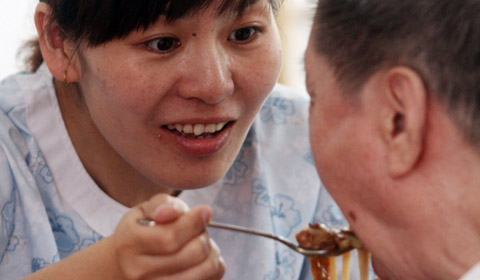Easing up on English
Updated: 2013-10-24 07:10
By Peng Yining, He Na and Wang Shanshan in Beijing (China Daily USA)
|
||||||||
World's second language to play smaller role in national college entrance exams, report Peng Yining, He Na and Wang Shanshan in Beijing.
Yin Zixuan, an 18-year-old high school student in Beijing, started learning English as a child in kindergarten.
"We've always been told that the English language is important for getting into a good college, finding a good job and a lot of other things," he said. "And then, all of sudden, we're told that its role will be reduced in the most important test for Chinese students."
Starting in 2016, the points for English in China's national college entrance examination, gaokao, will fall from 150 to 100, according to a draft paper released by the Beijing Education Examinations Authority on Monday, which was aimed at gauging public opinion.
Yin said the reform, if implemented, would be a big change for students and schools in Beijing.
"The school doesn't care about things that aren't related to exams, most importantly, the gaokao. Our classes are always test-oriented," he said. "I can imagine how happy those who are not very good at English would be, but I think English is important, not just for gaokao, but also for the future, to ensure better job opportunities. However, I'm applying to a college in the United States. If I succeed, I won't even have to take the national entrance exam," he said.
Preparing for change
Hu Hongyang, vice-president of Nanjing Foreign Language School, one of eight foreign-language schools built in 1963 on the orders of then Premier Zhou Enlai to nurture China's future diplomats, said the policy is a sign of things to come and schools will inevitably cut the number of hours they devote to teaching English.
"The gaokao is still like the orchestra conductor's baton in most places in China," she said. "I have heard that some county-level schools are already considering cutting back on English classes in preparation for the new policies.
"Many provinces have spoken about lowering the status of English in the college entrance exam, but no one expected Beijing to do it so quickly and to be the first place to make the decision," she added.
According to the draft paper, English tests will be conducted every six months during the three years students spend in high school, with their highest recorded score used as the final mark.
The top score attainable in the national entrance exam will remain 750 marks, with the number available for the Chinese section rising to 180 from 150. Total marks available for social and natural sciences will rise to 320 from 300.
If implemented, the changes would have huge repercussions for the private education sector, according to Kevin Peter, a US citizen who's been involved in English-language education in Beijing for six years.
"I think it's a tremendous opportunity for schools and companies that provide content and learning beyond the traditional exam areas, such as grammar, vocabulary, idioms, things like that," said Peter, who manages a privately owned school.
"From the time of its foundation, the school has never seen learning English as a goal in and of itself, but also as a means of expanding the students' worldview and helping them to become more curious and think more creatively and independently."
Strong competition
Peter said schools able to prove to parents that they provide value in several areas - developing character and independence, promoting a love of learning, engaging with, and being interested in, the opinions of others - should have nothing to worry about.
"Or perhaps I should say, less to worry about - the environment here in Beijing is very competitive, and there are a lot of challenges. However, any moves that lead to better-quality programs for learners and their families are moves in the right direction," he said.
Zhang Hong, director of the Golden Cradle Kindergarten, a Beijing-headquartered bilingual kindergarten chain, said society places too much emphasis on English skills, and that the impact of the gaokao is obvious even at the preschool level.
"Many organizations in Beijing provide English classes as a way of attracting the parents," she said. "But we insist that Chinese comes first, despite our focus on bilingual education, so the new policy won't change our syllabus."
Li Wenjun, a senior English teacher from Harbin in Heilongjiang province, said students are tested on so many linguistic technicalities in the English exams that they lose track of the key things they should master, especially crucial skills, such as reading.
"In light of the reality of the English-learning environment in China, it would be better for students to put their skills into practice by using learning materials in English, searching for useful information online, and things like that," she said. "Those are the most important techniques students should master; things that will help them to communicate in the real world, when they are admitted to colleges or universities."
One teacher at The High School Affiliated to Renmin University of China said the new policy might ease some of the pressure on English teachers in high schools.
"With less pressure from the gaokao, I could use a more practical method of teaching English, rather than getting bogged down in details such as the difference between 'which' and 'that'," said the teacher, who declined to be named.
Chu Zhaohui, a senior education researcher at the National Institute for Educational Sciences, said the proposed changes are intended to shift the focus of English-language education, from being test-oriented to practical use, but that doesn't necessarily mean that the language is less important.

Shifting the focus
Given that the total mark for Chinese would rise at the same time that the mark for English would fall, Chu said the policy may be an indication that the authorities are keen on shifting the focus from English to traditional Chinese culture.
"The importance of Chinese has been overlooked in recent years, while English is a boom area in the education market," he said. "However, we should not go to the other extreme."
Hu Hongyang believes the policy has been formulated in response to a growing belief that parents and schools pay too much attention to English-language education, and that bias has resulted in Chinese language studies being neglected.
There is also a theory that an overemphasis on English favors children from the cities because they have access to better resources, and this could become a cause of inequality, according to Hu.
"There's nothing wrong with placing greater value on the Chinese language and traditions, but the two languages and cultures don't have to be in competition. It's important that people gain an understanding of different cultures and a perception of a highly diverse world at a young age. This is the population China badly needs in the era of globalization," she said.
Hu suggested that if the government wants to encourage students to spend more time studying Chinese, more marks should be available for the Chinese element of the entrance exam, but that shouldn't automatically mean that the number of marks for English must be reduced.
As if to prove that languages need not compete, on Oct 18, English-language students from Hangzhou Foreign Language School took first prize in the finals of The Chinese Character Writing Contest, a primetime program on China Central Television that regularly attracted audiences of 660 million. A team representing Nanjing Foreign Language School also competed in the finals.
Bryson Miller, a teacher at Harbin University in the capital city of Heilongjiang province, said he thought it strange that the bar for English could be lowered while marks were added for other subjects.
The US national believes that English is playing an increasingly important role in helping China communicate with the rest of the world. Gaining a good grasp of a foreign language is very useful in helping people to better understand the world and broadening their intellectual horizons. English is becoming increasing important in an age of increasing contact between China and the rest of the world, he said.
"Take my experience, for example," he said. "I've learned some Chinese and can have a basic conversation with local people. I found the language really useful and that makes living in China easier. What's more, it gives me a deeper understanding of the Chinese people and the country."
Contact the writers at pengyining@chinadaily.com.cn and hena@chinadaily.com.cn
Zhang Yuchen and Tang Yue contributed to this story.
|
Speaking English is the focus of a class in Beijing on Wednesday. Liu Chang / for China Daily |

(China Daily USA 10/24/2013 page5)
Most Viewed
Editor's Picks

|

|

|

|

|

|
Today's Top News
Walmart China strategy: 110 new stores
China's GDP growth to 7.6%: Standard Chartered
Scholar looks at the kung fu-hip hop connection
Mobile giants talk future in Frisco
Starbucks' pricing furor: tempest in a coffee pot
100,000 Strong student exchange picks first partners
Report: China could profit rebuilding US
Holiday may boost sales of new iPads
US Weekly

|

|















